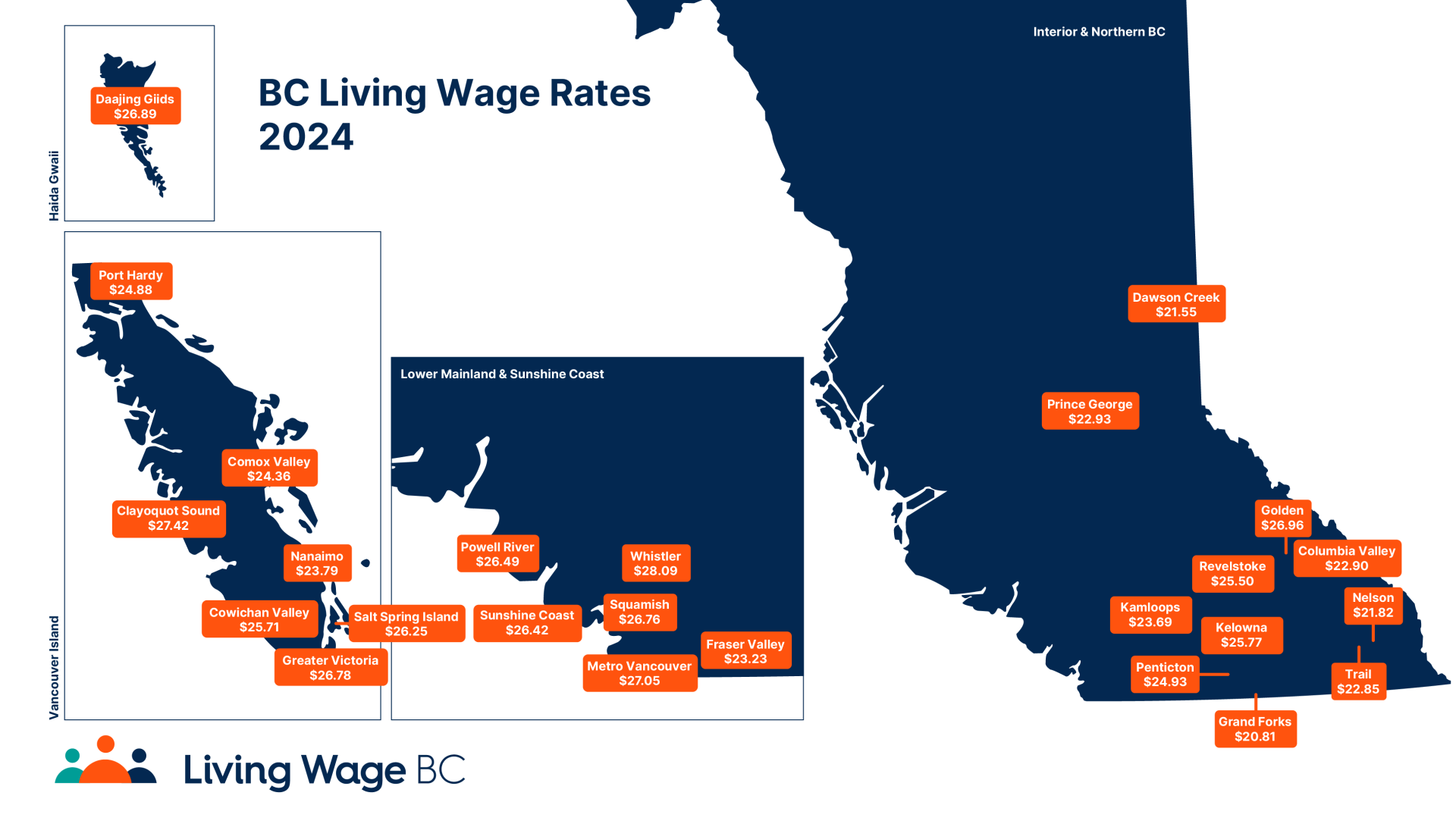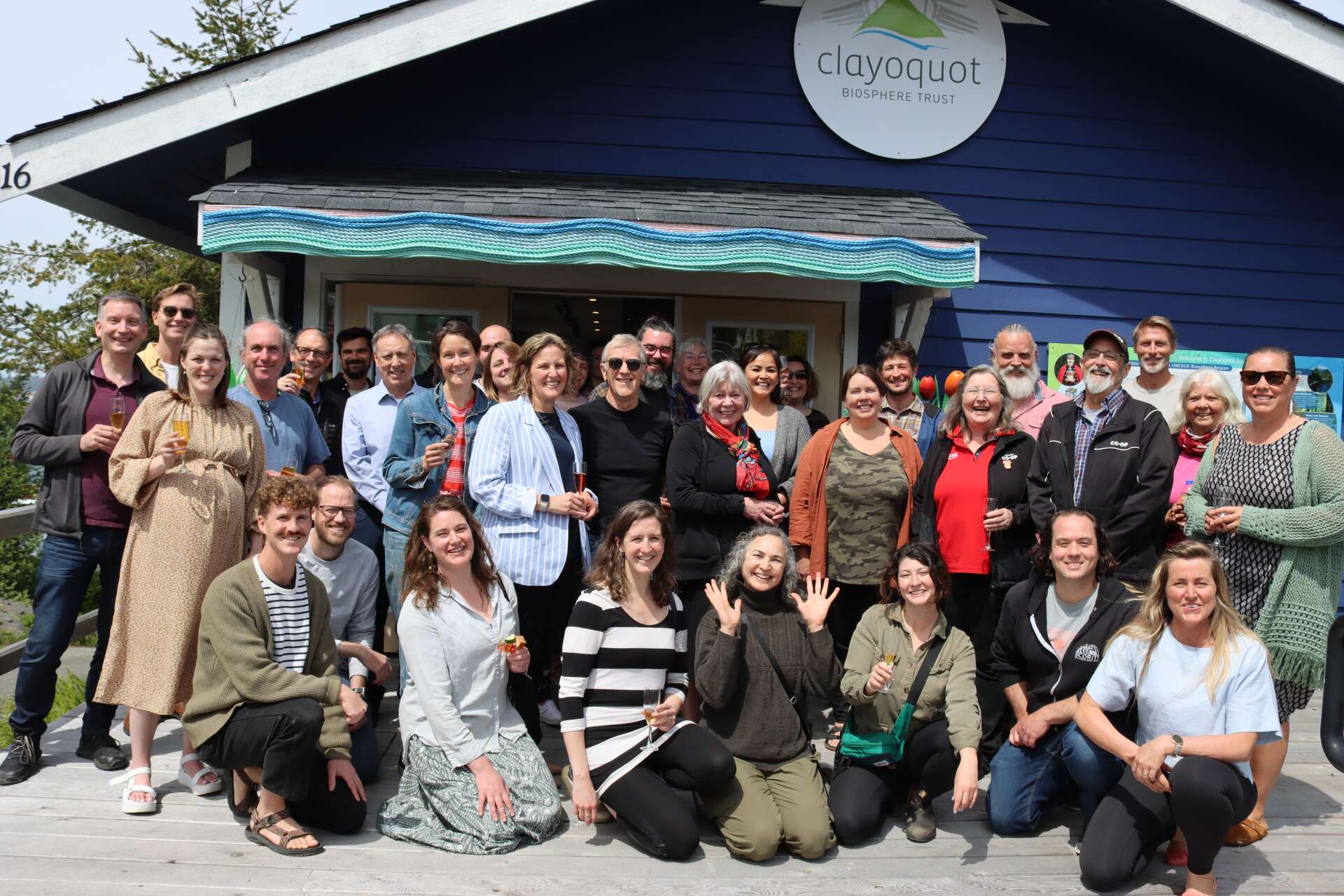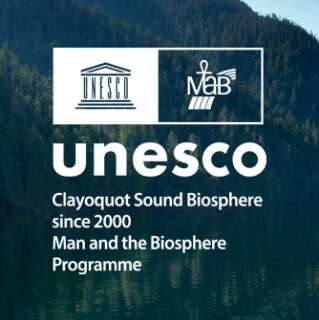What does the Living Wage mean to you?
 With help from Living Wage BC, we’ve calculated the west coast’s living wage for 2024. Across the province and the country, living wages have increased in recent years, mainly because of the costs of rent and food. The living wage:
With help from Living Wage BC, we’ve calculated the west coast’s living wage for 2024. Across the province and the country, living wages have increased in recent years, mainly because of the costs of rent and food. The living wage:
Is the hourly amount someone should earn to meet their basic expenses once government taxes, credits, deductions and subsidies are considered;
Is calculated for a family with two full time working parents and two children (age 4 and 7); this has been the model for the living wage calculations in BC for over twenty years but this year we piloted calculations for other dwelling types (discussed later in this blog post);
Does not include debt repayment or savings for future plans;
Is largely driven by specific local costs – particularly housing, food, and transportation;
Is calculated using a standardized formula across the province allowing comparisons between communities;
Can be reduced by employer benefits, like extended health and dental.
While we encourage employers to understand the benefits of paying a living wage, we also recognize how difficult this can be, especially for smaller west coast businesses. The living wage calculation is an invitation for everyone – workers, employers, and governments – to think about the systems that make our communities healthy, vibrant, and inclusive places to live.
The west coast regional living wage
The calculation includes the communities of Ucluelet, Hitacu, Macoah, Esowista, Ty-Histanis, Opitsaht, Ahousaht, Hot Springs Cove, and Alberni-Clayoquot Regional District Area C.
The 2024 regional living wage is $27.40, up from the 2023 regional living wage of $26.51, equating to an extra $6.75 per workday.
While this is a 3.43% rise, it's a lower increase than 20 of the 26 other BC communities who calculated a Living Wage this year.
This means local changes that make life more affordable have been working.
After years of having the highest living wage in BC, the west coast has the second highest (Whistler calculated theirs for the first time this year, and it is $28.09).
What has helped to slow the rate of increase for the west coast Living Wage?
Increased affordable housing in the region (e.g. there are now approximately 80 non-market dwellings ranging from studios to multi-bedroom apartments operated by Tofino Housing Corporation).
Transportation
Living in a rural and remote area means transportation is expensive. The living wage budgets for owning and operating two cars (for a family of four; single parents and individuals are calculated based on one car). Front-line workers need to be able to get to and from work, as well as travel for medical appointments.
While public transportation is improving, it’s not yet functional enough to “replace” a car logistically for residents. If improvements continue and the living wage could be calculated with only one car, the living wage would be reduced more than $2 to $25.29.
Housing
Housing (rent) is the single biggest annual expense and the largest contributor to the overall living wage, This year we drew our numbers from 4 different data sets:
- Advertised listings in local housing facebook groups (highest averages)
A survey of locals reporting the rent they pay (second highest averages)
2021 Census data adjusted to 2024 market rates (lower averages)
Tofino Housing corporation rates excluding rent-geared-to-income or deep subsidy rates (lower averages)
Staff accommodation could not be factored in because:
There’s very little data available about staff accommodation;
Job-dependent housing reduces workers' freedom to seek better opportunities or leave unsafe situations; and
The provincially standardized formula doesn’t include staff accommodation.
However, we know staff accom is a significant part of the local housing picture, highlighting the complexity around discussing the “real” costs of living in the area.
Calculating an “average” housing cost is difficult because many leases are not advertised and thus not trackable. Among the data we have access to, there is also wide variability in rental costs that depends on:
The year you signed your lease and how well protected you are with rent control;
Landlords choosing to rent for less than the maximum market value for various reasons;
Dwelling size, quality, and location; and
many more factors.
Because rent is such a significant expense, small changes in average rent mean big changes in the calculated living wage. For example, a $200 decrease in average monthly rent results in a $1 decrease in the living wage.
Piloting of Living Wages for other household types
This year, we tested calculations for household types beyond the family of four. Locally the results were:
Single parent with 1 child: $28.48 - assumes a 2-bedroom rental and one car.
Single individual with no children: $29.09 - assumes a 1-bedroom rental and one car.
The results are largely because of the child-related subsidies that parents are eligible to receive. However, these calculations should still be considered “pilot” numbers and we will continue refining the calculations in future years.
Takeaways and Reflections
Ultimately there is no way to create a "universal" Living Wage budget because everyone's situation is unique. Some of the costs that contribute to the living wage calculation are consistent across “the market” – for example, a basket of groceries costs the same no matter the buyer. However, housing is highly variable – the age of someone’s lease, for example, might mean their living wage is substantially less than someone who moved recently.
It is also important to recognize elements of the calculation methodology that may not capture the working reality for sectors here. For example, many hospitality and trades jobs are not year-round with a 35 work week.
However, we're confident in validating all costs based on locally accessed data. We followed a province-wide formula to see how we compare to other communities while knowing there are many quirks in our local economy that don’t readily compare to other places. At a time when the cost of living is making headlines, we’re thankful to have a localized tool to inspire discussion about what it really costs to live in these communities we call home.
Contact colin@clayoquotbiosphere.org with any questions or to set up a chat. He'd be happy to connect with you!

